Birth
September 13th, 1922 in Puerta de Tierra, San Juan, Puerto RicoEducation
- 1942, Teacher’s Certificate, University of Puerto Rico,
- 1952, BA Sociology, Hunter College, New York, NY, 1952,
- MSW Columbia University School of Social Work,
- 1973, PhD. Union Graduate School (now Union Institute & University), Cincinnati, Ohio.
Death
May 24th, 2002 in New York, NY, USADr. Antonia Pantoja was an Afro Puerto Rican educator, social worker, feminist, and civil rights leader. Born into poverty, Dr. Pantoja moved to New York City in 1944 at the age of twenty-two. She dedicated her life to bringing educational and economic opportunities to the Puerto Rican community in New York and around the country, and she was the architect of several of the oldest Puerto Rican organizations in the United States.
Personal Information
Name(s)
Antonia (Toni) Pantoja
Date and place of birth Birth
Born: September 13, 1922, in Puerta de Tierra, San Juan, Puerto Rico
Date and place of death
Died: May 24, 2002, New York, NY
Family:
Dr. Pantoja was raised by her grandparents, Luisa Acosta de Pantoja and Conrado Pantoja Santos. In her biography, Dr. Pantoja wrote, “I never knew who my father was.” She was born to Alejandrina Pantoja, an unwed mother.
Mother: Alejandrina Pantoja
Father: unknown
Marriage and Family Life:
Dr. Pantoja is survived by her partner of thirty years, Dr. Wilhelmina Perry.
Reticent about talking of her private life, which was the custom and norm of the period, Dr. Pantoja, in her lifetime neither denied nor affirmed her lesbian identity publicly. Although they never kept their relationship a secret, their public advocacy work did not focus on LGBTQ issues for fear that homophobia would jeopardize the good work they were doing in other areas. However, in 2012 in Chicago, a posthumous tribute “honoring Lesbian Puerto Rican educator and activist Dr. Antonia Pantoja” was held on June 1st at the Institute for Puerto Rican Arts and Culture, which launched both Puerto Rican Independence Month and Pride Month.
In 1957, Dr. Pantoja founded the Puerto Rican Forum (originally the Hispanic American Youth Association or HAYA), which served as an incubator for organizations and programs promoting economic self-sufficiency. In 1961, Dr. Antonia Pantoja and a group of Puerto Rican educators and professionals. created ASPIRA (which means aspire in Spanish), to address the exceedingly high dropout rate and low educational attainment of Puerto Rican youth.
She joined the faculty of the San Diego State University's School of Social Work in 1973, where she became the Director of the Undergraduate Program in Social Work. There she met her future wife, Dr. Wilhelmina Perry and they co-founded the Graduate School for Community Development, a private free-standing educational institution. Established in 1975, the Graduate School for Community Development, fomerly known as the Graduate School for Urban Resources and Social Policy, formed the heart of Pantoja's efforts to create an academic program and environment that fostered community development and trained individuals from both national and international locales to build institutions that helped resolve issues of unemployment, poverty and lack of education in their communities.
Dr. Pantoja and Dr. Perry eventually left academia to focus more on activism and institution building, splitting their time between California, New York, and Puerto Rico. Health problems led the two to settle permanently in New York.
Dr. Pantoja did not write about her profound and lasting relationship with Dr. Perry in her autobiography Memoir of a Visionary: Antonia Pantoja released just before her death-- her only regret in life. Rather, she offered the dedication in her memoir to Dr. Perry with the following words: “The book is dedicated to my friend and partner, Wilhelmina Perry. She has been by my side through the pains, glory, and excitement of life. This book could not have been completed without her constant encouragement and direct assistance.”
Later, Dr. Perry did publicly claim their Lesbian identity and long-term commitment to each other in the documentary film by Lillian Jimenez in 2009: a decision which Dr. Pantoja supported, stating that she deferred to and entrusted Dr. Perry and the filmmaker to do what was “right and necessary.”
Education
Dr. Pantoja received her primary and secondary education in Puerto Rico and in 1942 earned a Teacher’s Certificate from the University of Puerto Rico.
She received a scholarship to Hunter College in Manhattan, where she graduated with a bachelor's degree in sociology in 1952. She then studied at Columbia University School of Social Work, where she earned her master's degree in 1954. In 1973, she earned her Ph.D. from Union Graduate School (now Union Institute & University) in Cincinnati, Ohio.
Religion
Dr. Pantoja did not practice any religion.
Transformation(s)
A Black Puerto Rican woman, born in poverty in 1922, Antonia Pantoja moved to New York City at the age of 22 in 1944, where she found a job as a welder in a munitions factory.
A trailblazer, educator, and activist, Dr. Pantoja pulled together elements of the Puerto Rican community at a time in the 1950’s when the rapidly growing community found itself in tremendous need of organization. Puerto Ricans needed and were clamoring for decent jobs, decent housing and a decent education. In 1964, Dr. Pantoja shifted her emphasis from self-help programs to the reformation of the educational system.In 1967 she served on a mayoral committee, convened by the then Mayor of New York City, John Lindsay, and was elected to become a delegate at-large to the New York State Constitutional Convention. That same year, she was tasked with the cohort to write a new constitution for New York.
She dedicated her life to providing economic and educational opportunities for Puerto Ricans in New York and around the country, and was the architect of several of the oldest Puerto Rican organizations in the United States. A respected and admired, “institution builder,” the generations of Puerto Ricans and other Latin American immigrants who followed have a better chance at success today because of her significant and groundbreaking work.
In her lifetime, Dr. Pantoja reaffirmed her commitment to a liberatory and social justice praxis and is noted for often stating, “You cannot live a life that is lukewarm. You’ve got to live a life of commitment and passion. A passionate life. And by passion, I mean passion in that sense—the passion of doing, producing, thinking, and dealing with making the world a better place.”
Contemporaneous Network(s)
Dr. Pantoja worked with the Ford Foundation, the National Urban Coalition, the National Association of Social Workers and the Council on Social Work Education.
In the forward to Dr. Pantoja’s memoir, Mr. Henry A. J. Ramos, Executive Editor of the Hispanic Civil Rights series for the publisher, noted, “Antonia Pantoja emerged during the 1960s as a leading figure in establishing the Puerto Rican community’s place in regional and national policy-making. Pantoja was born in Puerta de Tierra, a slum of the Old San Juan City in Puerto Rico and raised in Barrio Obrero, a worker housing community located on the outskirts of the island’s capital city. She was initially introduced to progressive politics through the work of her grandfather, a union leader employed at the American Tobacco Company. But Pantoja’s real politicization came after she migrated to New York City to pursue her interest in education and the larger world beyond Puerto Rico.”
less
Significance
Works/Agency
Antonia Pantoja (September 13, 1922 – May 24, 2002) was an Afro Puerto Rican educator, social worker, feminist, and civil rights leader who contributed a memoir about her life and produced knowledge of intellectual, political and socio-cultural significance with the following works:
- "Memoir of a Visionary: Antonia Pantoja", Houston: Arte Publico Press, 2002.
- "Puerto Ricans in New York: A Historical and Community Development Perspective", Centro: Journal, Vol. 2, No. 5, Spring 1989, pp. 21–31.
- "A Guide for Action in Intergroup Relations", Social Group Work: Selected Papers from the National Conference on Social Welfare, 1961.
- "A Third World Perspective: A New Paradigm for Social Science Research", Research: A Third World Perspective, Western Interstate Commission for Higher Education, 1967, pp. 1–17.
- "Community Development and Restoration: A Perspective and Case Study", Community Organizing in a Diverse Society. Edited by John L. Erlich and Felix G. Rivera. Boston: Allyn and Bacon, 1998., pp. 220–242.
- "Cultural Pluralism, A Goal to be Realized", Voices from the Battlefront: Achieving Cultural Equity. Edited by Marta Moreno Vega and Cheryll Greene. New Jersey: Africa World Press Inc., 1993, pp. 135–48.
- "Social Work in a Culturally Pluralistic Society: An Alternative Paradigm", Cross-Cultural Perspectives in Social Work Practice. Houston: University of Houston, 1976, pp. 79–95.
- "The University: An Institution for Community Development", Coming Home: Community-based Education and the Development of Communities. Washington, D.C.: Clearing House for Community-based, Free-standing Educational Institutions, 1979, pp. 28–33.
- "Toward the Development of Theory: Cultural Pluralism Redefined", Journal of Sociology and Social Welfare IV, 1976, pp. 125–46.
The recipient of numerous awards and certificates, Dr. Pantoja was recognized for her achievements and contributions to community development and institution building. From proclamations and certificates of appreciation to numerous honorary doctorates bestowed by institutions such as the University of Puerto Rico, The New School, City University of New York, and the University of Massachusetts, these point towards the impact and influence Dr. Pantoja's professional commitments had on those around her.
Reputation
A feisty, tireless, visionary leader and architect of many institutions, Dr. Pantoja started in the U.S.A. as a factory worker, lamp designer, city government worker and rose to become an acclaimed social worker.
In her memoir, she writes, “My life has been one of action, learning, and teaching, a life of building with others, a life of fighting injustice and trying to change conditions and relations that are wrong because they deny people their rights and destroy their potentialities. I consider myself an educator, a teacher. However, by teacher, I mean one who engages with the learner and becomes a teacher/learner.”
Her lasting reputation includes having been the principal engineer of some of the most enduring Puerto Rican organizations in New York City. During this time, she learned English, received advanced academic degrees from Columbia University and a Ph.D. in 1973 from Union Graduate School (now Union Institute & University), Cincinnati, Ohio.
She was also instrumental in taking the New York school system to the United States Supreme Court, to protect the language and learning rights of Puerto Ricans and other Spanish-speaking students in New York public schools. Her work captured the attention of the former U.S. Senator Robert F. Kennedy and former New York City Mayor, John Lindsay, as well as various dignitaries throughout the Americas.
Legacy and Influence
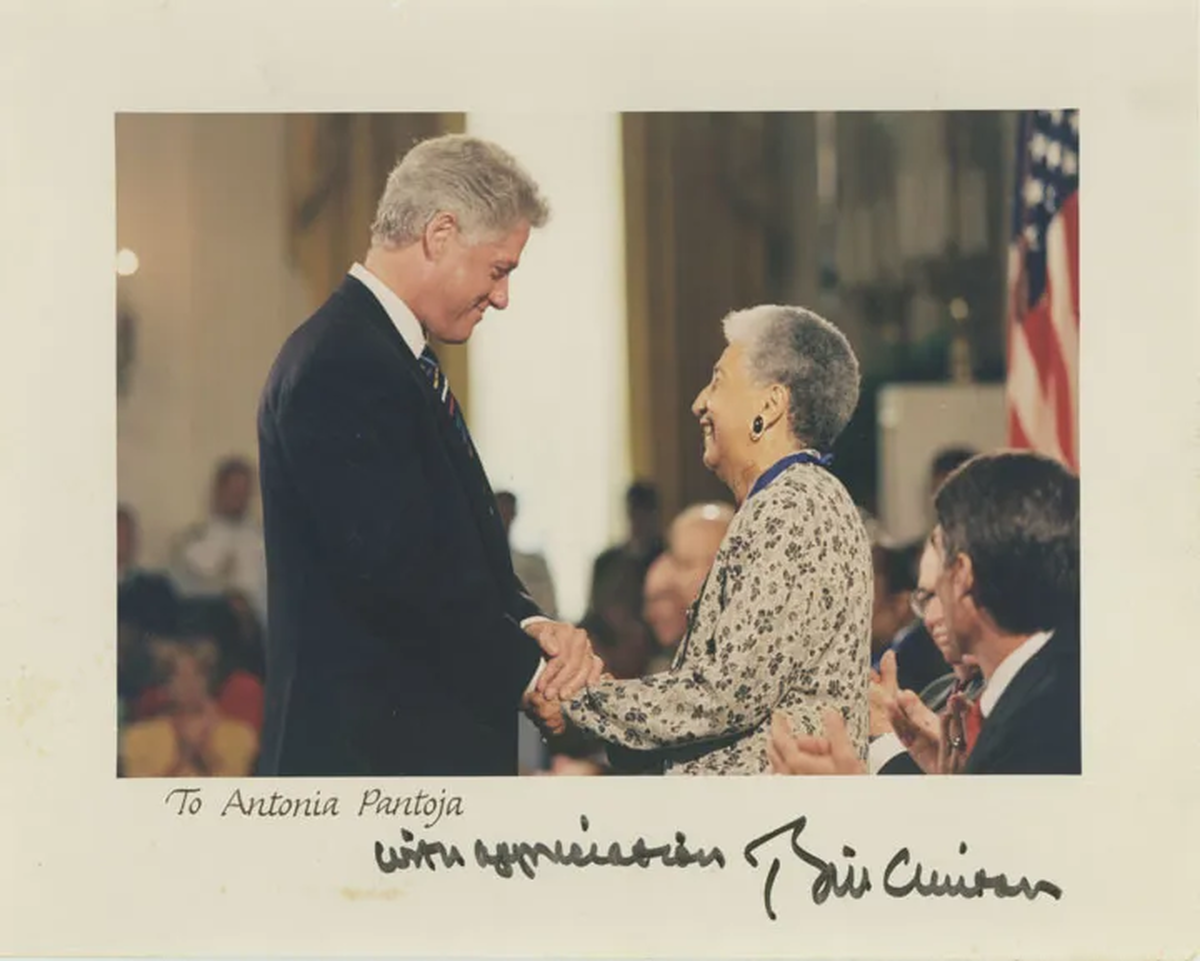
President Bill Clinton presented Dr. Antonia Pantoja with the Presidential Medal of Freedom in 1996. (Photo Credit: Estate of Dr. Antonia Pantoja)
Having dedicated her life to bringing educational and economic opportunities to the Puerto Rican community, one of her stand-out contributions was through ASPIRA, (derived from the Spanish word, aspire) an organization she founded with colleagues of the Puerto Rican Forum, in 1961 which aspired and assisted scores of Puerto Rican youth to continue their education, pursue careers and retain a sense of identity. She served as ASPIRA’s President from 1961 until 1966.
For her message of empowerment and her committed efforts to turn dreams into reality, former President Bill Clinton Awarded Dr. Pantoja, with the Presidential Medal of Freedom in 1996. The first Puerto Rican ever to receive the highest civilian honor,
Dr. Pantoja authored her own memoir, released in 2002, by Arte Publico Press. Documentary filmmaker and media activist, Lillian Jiménez’s profiled the pioneering activist in “ANTONIA PANTOJA ¡Presente!,” which premiered in 2009 and was broadcast on PBS; in 2015, a cadre of community leaders and friends supported the creation of a mosaic mural of Dr. Pantoja in East Harlem by artist, Manny Vega.
Her activism touched all levels of community action from voter registration to community economic development and empowerment through education. In Chicago, IL, the Aspira Antonia Pantoja High School, strives to provide a holistic approach to education while preparing students for success-- its mantra, “Leadership Through Education.”
Among the generations of notable ASPIRA graduates (known as "Aspirantes") are:
-
Fernando Ferrer, former Bronx president, who ran for NYC Mayor in 2001 and 2005 unsuccessfully.
-
Angelo Falcón, a late prominent political scientist and President of the National Institute for Latino Policy (formerly the Institute for Puerto Rican Policy).
-
Anthony Romero, executive director of the American Civil Liberties Union;
-
Ninfa Segarra, former President of the Board of Education of New York, former Deputy Mayor under Mayor Rudolph Giuliani, and former lobbyist with Toñio Burgos & Associates and is President of the National Puerto Rican Coalition in Washington, D.C.
-
Aída Álvarez, former director of the Small Business Administration under President Bill Clinton.
-
Nelson Diaz, first Puerto Rican Solicitor General in Philadelphia.
-
Jimmy Smits, Puerto Rican actor.
-
Luis Guzmán, character actor.
-
The Honorable Camelia M. Valdes, Esq., Passaic County Prosecutor.
-
Dr. Isaura Santiago Santiago (Ph.D., Fordham University), first tenured Puerto Rican woman at Columbia University and first Puerto Rican woman president of Hostos Community College of the City University of New York.
-
Digna Sanchez, who led such organizations as the Puerto Rican Socialist Party (PSP), MADRE and Learning Leaders in New York City; she also worked at the Puerto Rican Legal Defense Fund, the United Way of New York City, and the Children's Television Workshop.
-
Amilkar Velez-Lopez, attorney and retired municipal court judge in Newark, NJ.
-
Nilda I. Ruiz Singh, (M.B.A.) President/C.E.O. of Asociacion Puertorriquenos en Marcha, Inc. (APM).
-
Hon. Iris Martinez, Senator, State of Illinois, first Latina in the state Senate.
-
Billy Ocasio, Billy Ocasio, Former Councilman; CEO and president, National Museum of Puerto Rican Arts and Culture.
-
Fernando Grillo, Esq. Current, CEO, Aspira of Chicago (Chicago, IL). https://aspirail.org/who-we-are/our-leadership/.
-
Ada Nivia Lopez, Educator, American Civil Liberties Union of Illinois, Board Member (present), Author, Asi Somos | Who We Are, University of Illinois Trustees, member (First Latina elected statewide 1993-1999), Appointed to the Board of Education, 1986.
-
Madeline Roman, Vice President, Academic Affairs, St. Augustine College, Dean Wilbur Wright College, Humboldt Park Vocational Center, 1999-2014.
Dr. Antonia Pantoja continued a life dedicated to activism until the age of 82.
less
Controversies
Controversy
A fearless warrior and champion for bilingual education.
Dr. Pantoja directed most of her energies to improving the performance in New York schools of Puerto Rican children, children of Spanish speakers who were taught only in English. By 1961, two out of three eighth graders had fallen more than three years behind in reading; by 1963, when there were 179,000 Puerto Rican public school students, only 331 received high school academic diplomas, and only 28 went on to college.
In 1972, frustrated by what Dr. Pantoja saw as the continuing failure of city schools to educate Puerto Rican students -- who still had a graduation rate of only 30 percent -- Aspira filed a civil rights suit in federal court demanding that New York City provide classroom instruction in Spanish for struggling students.
The suit resulted in a 1974 ruling ordering the city to establish bilingual classes and English as a second language classes for Latino students whose English skills were in the lowest fifth.
Current Identification(s)
Dr. Antonia Pantoja,
Antonia “Toni” Pantoja,
civil rights,
bilingual education,
institution builder,
Puerto Rican history,
Nuyorican
Educator
social worker
Feminist
civil rights leader
less
Bibliography
"A Guide for Action in Intergroup Relations", Social Group Work: Selected Papers from the National Conference on Social Welfare, 1961.
Antonia Pantoja, Champion Of Bilingualism, Dies at 80: [Obituary (Obit)] Lavietes, Stuart. New York Times, Late Edition (East Coast); New York, N.Y. 28 May 2002.
“Antonia Pantoja: Fighting for Puerto Rican New York.” Hidden Voices: Untold Stories of New York City History, NYC Department of Education, 2019 pgs. 113–119.
Columbia University School of Social Work: Alumna and Presidential Medal of Freedom Honoree, Dr. Antonia Pantoja, Celebrated with Mural in East Harlem. https://socialwork.columbia.edu/news/alumna-presidential-medal-freedom-honoree-antonia-pantoja-celebrated-mural-east-harlem/
ANTONIA PANTOJA, ¡Presente! A film by Lillian Jiménez, 2009, available via Women Make Movies.
Artist Manny Vega to bring beauty, inspiration to NYCHA residents. Mural of Dr. Pantoja in East Harlem.
https://pix11.com/news/local-news/manhattan/artist-manny-vega-to-bring-beauty-inspiration-to-nycha-residents/.
ASPIRA, About our Founder, Dr. Antonia Pantoja.
"A Third World Perspective: A New Paradigm for Social Science Research", Research: A Third World Perspective, Western Interstate Commission for Higher Education, 1967, pp. 1–17.
Dr. Antonia Pantoja honored as Pride Month starts. Maxwell, Carrie. Windy City Times; Chicago, Ill. 06 June 2012. https://www.windycitytimes.com/lgbt/Dr-Antonia-Pantoja-honored-as-Pride-Month-starts/38017.html
"Community Development and Restoration: A Perspective and Case Study", Community Organizing in a Diverse Society. Edited by John L. Erlich and Felix G. Rivera. Boston: Allyn and Bacon, 1998., pp. 220–242.
"Cultural Pluralism, A Goal to be Realized", Voices from the Battlefront: Achieving Cultural Equity. Edited by Marta Moreno Vega and Cheryll Greene. New Jersey: Africa World Press Inc., 1993, pp. 135–48.
Dr. Pantoja, Wikipedia: https://en.wikipedia.org/wiki/Antonia_Pantoja.
Guide to the Dr. Antonia Pantoja Papers, Center for Puerto Rican Studies, HUNTER College, CUNY. https://centropr-archive.hunter.cuny.edu/sites/default/files/faids/pantojaf.html
"Memoir of a Visionary: Antonia Pantoja", Houston: Arte Publico Press, 2002. Foreword by Henry A. J. Ramos. ISBN: 978-1-55885-385-0. Publication Date: March 31, 2002. Pages: 218. The fascinating autobiography of a community organizer.
https://artepublicopress.com/product/memoir-of-a-visionary-antonia-pantoja/
"Puerto Ricans in New York: A Historical and Community Development Perspective", Centro: Journal, Vol. 2, No. 5, Spring 1989, pp. 21–31.
"Social Work in a Culturally Pluralistic Society: An Alternative Paradigm", Cross-Cultural Perspectives in Social Work Practice. Houston: University of Houston, 1976, pp. 79–95.
The legacy of Dr. Antonia Pantoja, El Diario La Prensa; New York, N.Y. [New York, N.Y]. 31 May 2002.
"The University: An Institution for Community Development", Coming Home: Community-based Education and the Development of Communities. Washington, D.C.: Clearing House for Community-based, Free-standing Educational Institutions, 1979, pp. 28–33. "Toward the Development of Theory: Cultural Pluralism Redefined", Journal of Sociology and Social Welfare IV, 1976, pp. 125–46.
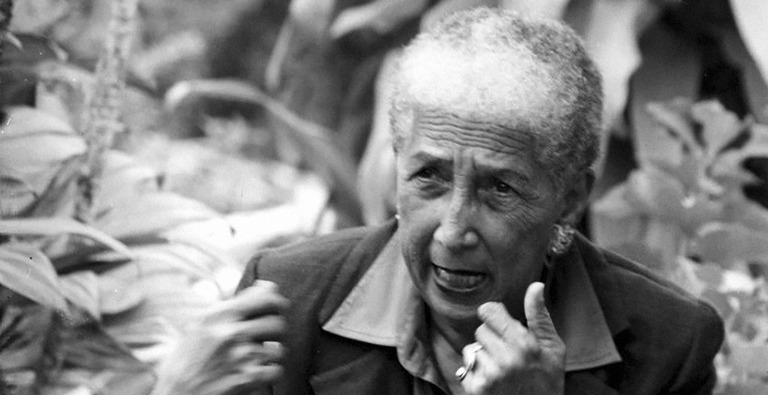
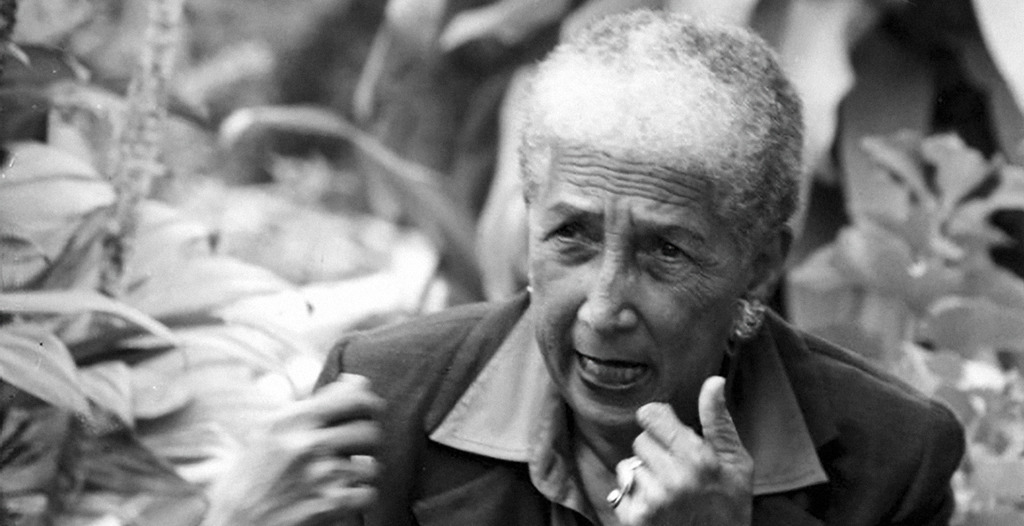
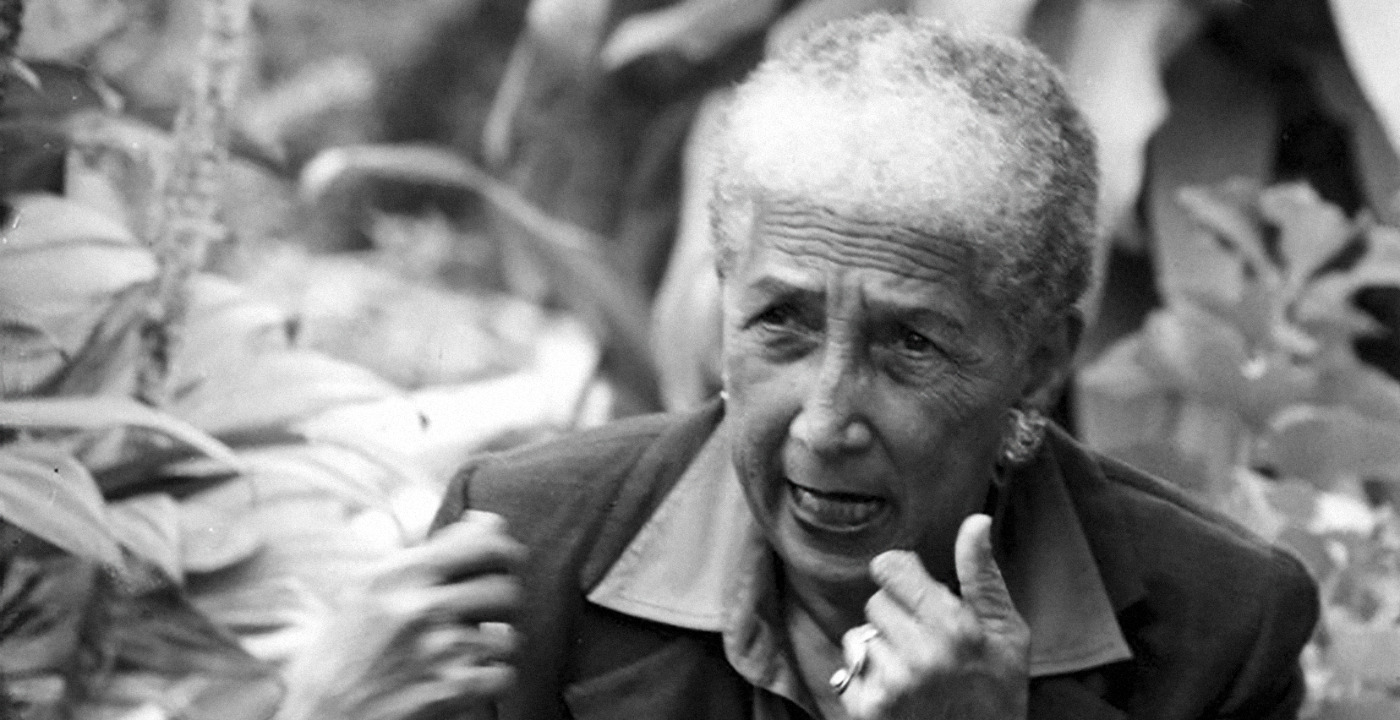
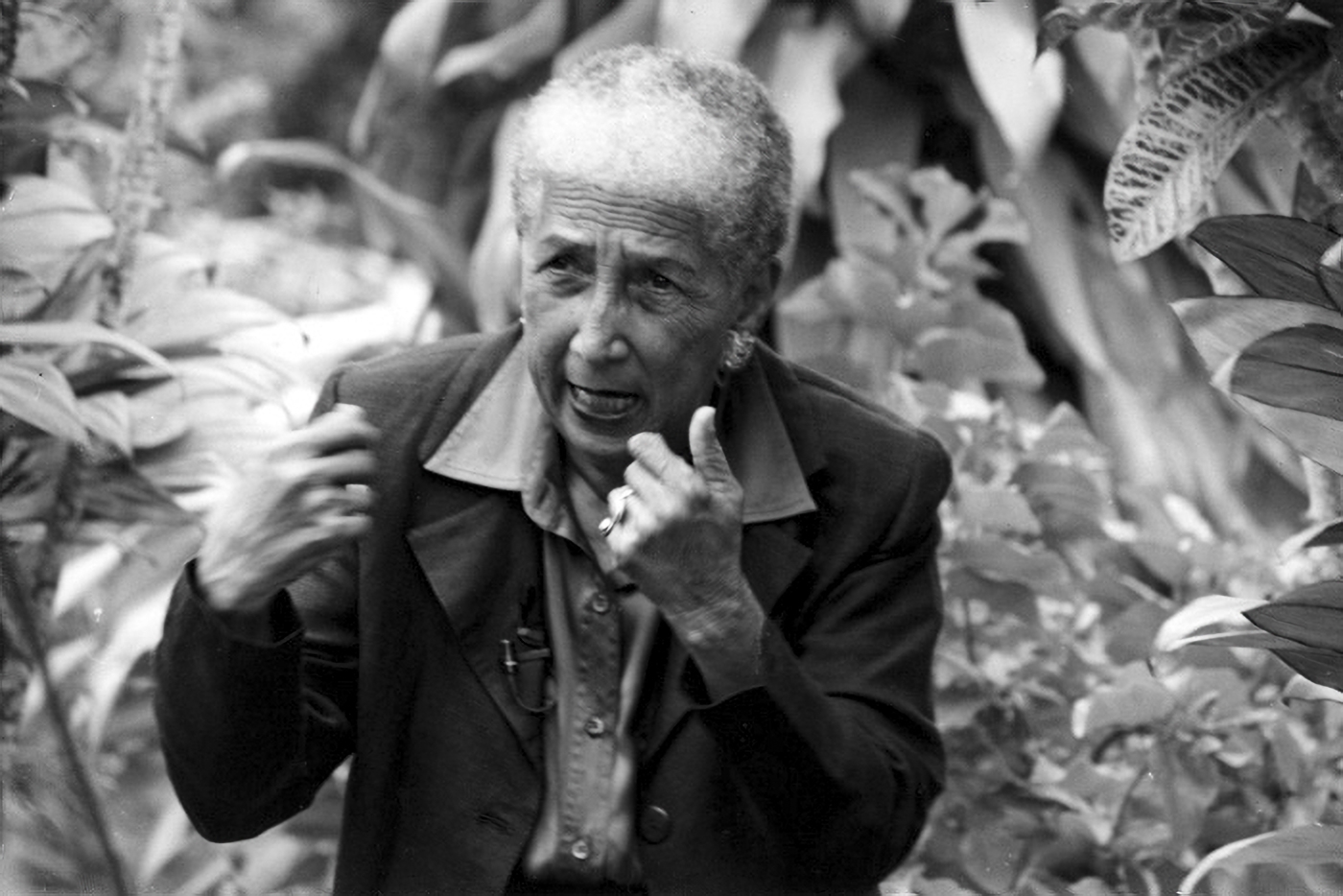
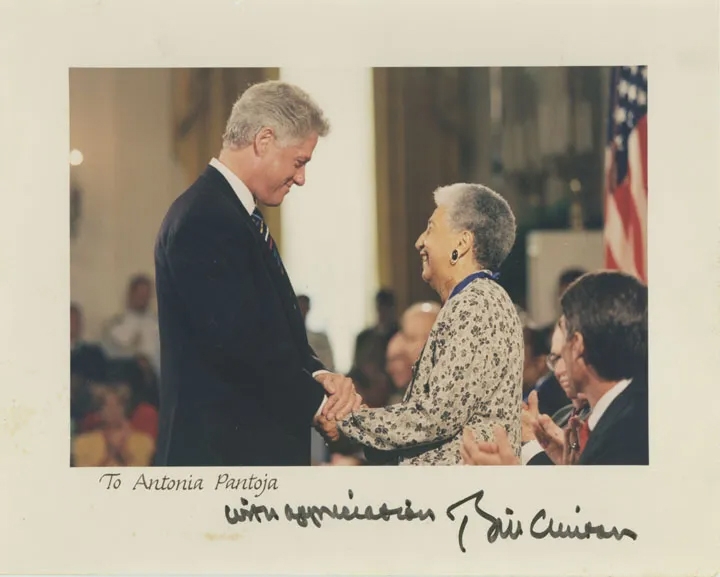
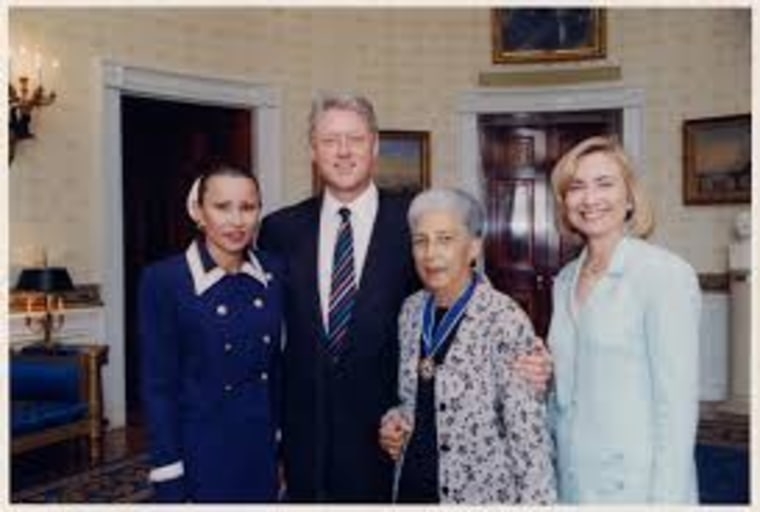
Comment
Your message was sent successfully